The 5 best apps to learn a new language in 2017
I love to learn new languages, as a way to communicate to people or just to understand better a different culture but I am not a big fan of long and boring language books.
That’s why when I decided I wanted to improve my German I tried several apps, both free and paid and here I will give you my opinion on their pros and cons.
Honestly speaking, most of them won’t help you much, unless you aim to simply improve your vocabulary. If you are starting from zero the best choice would be to pair one of these app with another resource where to learn grammar because in most apps the quality of explanations is not sufficient.
The apps in this list can be used all at the same time as they offer different types of exercises and you will gain more by not focusin only on one of them. So I suggest you try all of them and stick with at least two for the best results.
1. Busuu
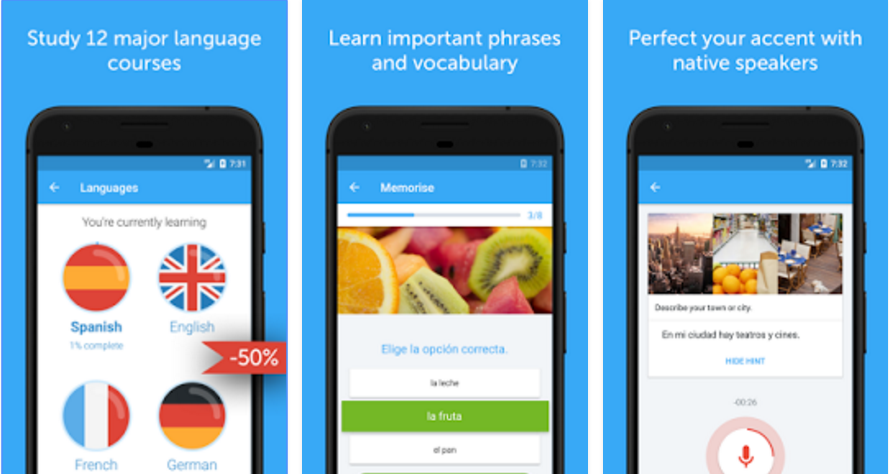
Personally, I think Busuu deserves to be in the first place of this list for many reasons. The curriculum is well structured and offers 4 different levels of proficiency, from beginner to upper intermediate. We can find the usual exercises to match a picture to its word but also many more advanced, from filling in a dialogue to what I think is the best feature of the app: the free writing section. Here, we are given a topic and we can write as much as we want, thus testing our skills. Our short essay will then be marked by other users, usually native speakers of the language and we will receive almost instant feedback.
Busuu is available in twelve languages: English, Spanish, French, German, Italian, Portuguese (Brazil), Russian, Polish, Turkish, Arabic, Japanese and Chinese.
It follows a freemium model, where some content is blocked behind a monthly subscription and it is available on iOS, Android and as a WebApplication.
PRO
- Great Content
- Feedback from native speakers
- Concise but effective grammar explanations
CONS
- Limited to 12 languages
- Freemium model
Available: iOS, Android, Web
Languages you can learn: English, Spanish,French, German, Italian, Portuguese, Chinese, Japanese, Polish, Turkish, Russian and Arab
2. Lingvist
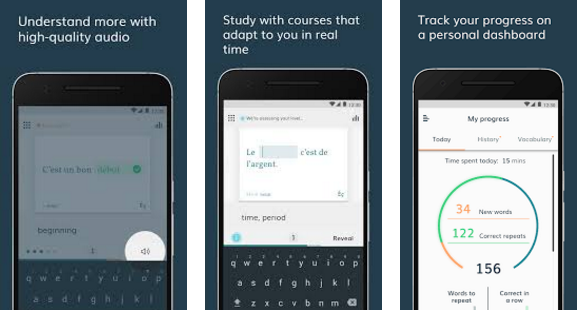
At the second spot I’m placing Lingvist, a fairly new app compared to the others on this list. It is currently still in Beta but it offers an interesting approach to learning a language and it is completely free (until it is still in Beta).
It works by mixing Cloze tests (sentences where you have to fill in a gap) and spaced repetition meaning that you will only see the same word only when their algorithms thinks it is best for you.
Learning new words with this app feels fun and before you can realize it you will be hooked and you will try everyday to beat your previous highscore.
Unfortunately, due to the app aiming to only increase your vocabulary you will still need to pair it with a book or another resource to fully improve your skills with a certain language.
Lingvist is available for iOs, Android and as a Web Application and at the moment it offers courses in French, German, Russian and Spanish.
PRO
- free
- fun and quick to use
- effective algorithm
- very good quality audio
CONS
- limited to learning new vocabs
- can get repetitive after a while
- limited to only 4 languages
Available: iOS, Android, Web
Languages you can learn: French, German, Russian and Spanish
3. Duolingo
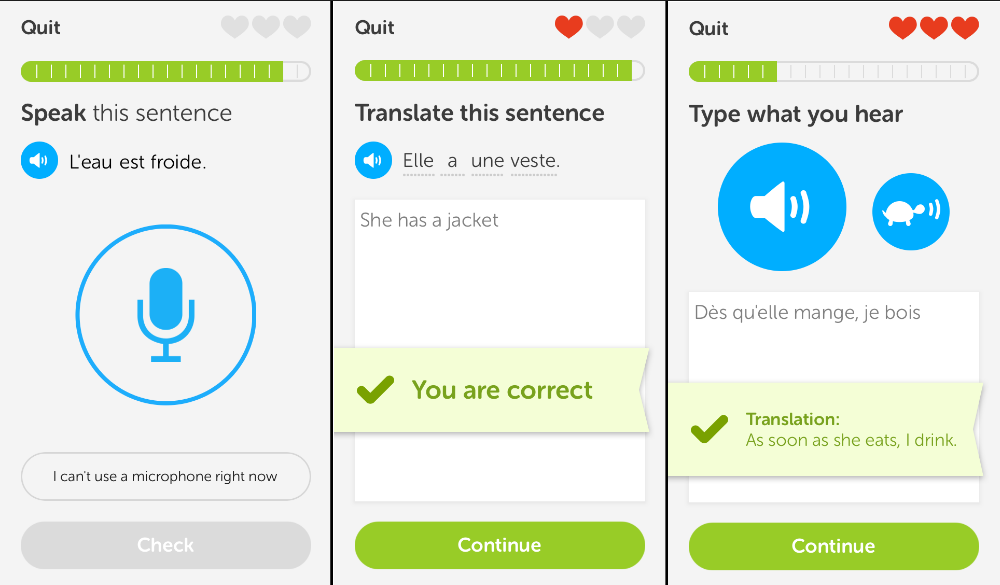
Ok, you probably already heard of Duolingo but if you didn’t, let me give you a brief introduction why it made it into my list.
Duolingo offers a staggering amount of content, providing courses in 23 different languages, for free. Yeah, you read it correctly, Duolingo is free.
It should not be a surprise now the reason why it is so popular. The exercises vary from matching pictures with words, reordering sentences and simple speaking exercises. Compared to Busuu, it offers more content for free but it lacks the interactivity between users and the possibility to give and receive feedback which I think it is very important when learning a new language.
PRO
- 23 different languages
- free
- tons of content
CONS
- repetitive structure of the exercises
- not very helpful in learning more than just simple sentences
Available: iOS, Android, Web
Languages you can learn: English, Arabic, Czech, Dutch, French, German, Greek, Hindi, Hungarian, Indonesian, Italian, Japanese, Korean, Polish, Portuguese, Romanian, Russian, Simplified Chinese, Spanish, Thai, Traditional Chinese, Turkish, Ukrainian, Vietnamese
4. Beelinguapp
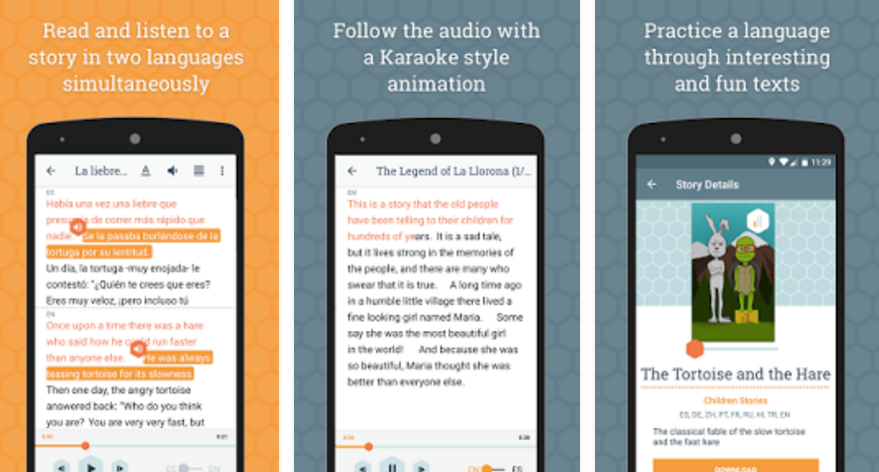
This is a very different app compared to the previous ones and that is why I wanted to include it in this list.
Instead of simply filling in gaps or memorizing words, Beelinguapp offers the users a series of short stories to read simultaneously in two languages. It is possible to listen to the audiobook or read by ourselves as well as the possibility to turn off one of the two languages.
The app offers a good amount of content for free, with more stories to be purchased.
When the usual exercises from Duolingo and Busuu gets boring, it is always refreshing to check out a new story on Beelinguapp.
PRO
- Fun way to learn
- 13 languages available
CONS
- Limited free content
- No grammar
Available: iOS, Android, Web
Languages you can learn: English, German, Spanish, Portuguese, French, Hindi, Korean, Russian, Chinese, Arabic, Italian, Japanese, Turkish
5. Memrise
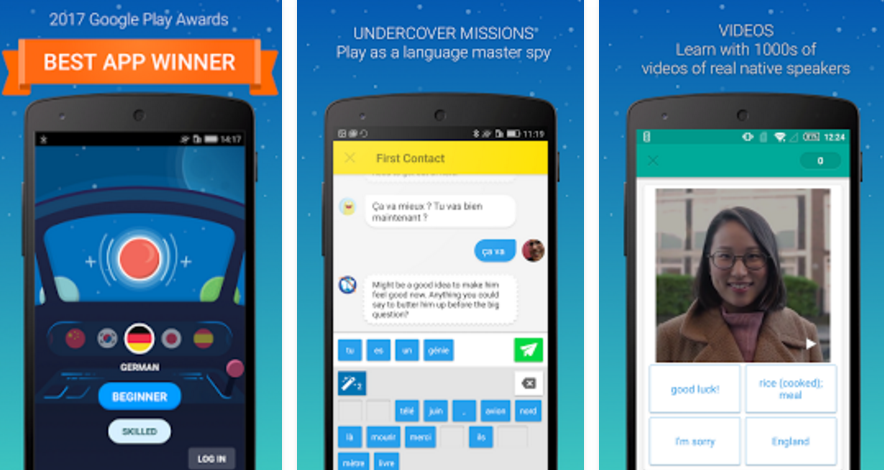
Lastly, I want to talk about Memrise, a flashcard app that makes learning new vocabularies fun and easy. Whilst it does not offer a complex algorithms for spaced repetition like the one we have seen in Lingvist, it does offer a lot of content for free. The core of the app is a flashcard system with cards created by both the developers and the users. The quality of these sets can vary a lot and finding the best one can be difficult.
The paid version offers more types of ways to revise the material but even the free version is enough to advance your learning of a new language.
Memrise not only offers languages courses but also other topics such as History, Art, Geography and more.
Currently it offers 14 languages and it is available for both iOS and Android as well as a Web Application.
PRO
- 14 languages
- many courses to choose from
CONS
- not everything is free
- limited to learning new vocabularies
Available: iOS, Android, Web
Languages you can learn: French, Spanish, Korean, Chinese, Italian, German, Portuguese, Russian, Danish, Swedish, Polish, Norwegian, Turkish and Arabic
Other apps worth considering
Hello Chinese
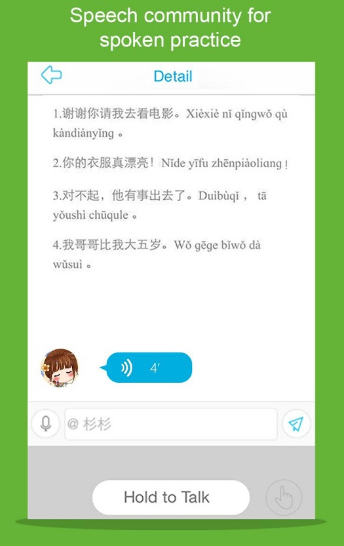
Probably the best app to learn chinese
Available: iOS, Android, Web
Babbel
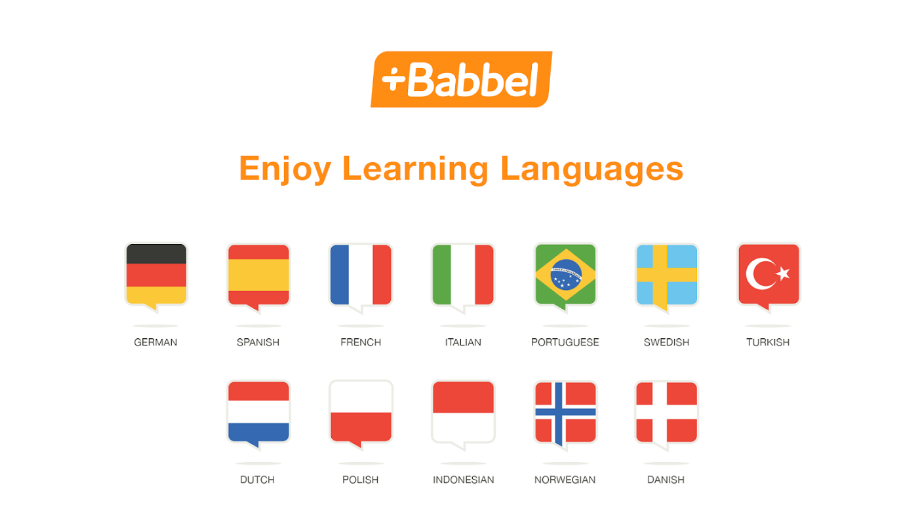
A good alternative to Duolingo or Busuu but only a small amount of content is free
Available: iOS, Android, Web
Rosetta Stone
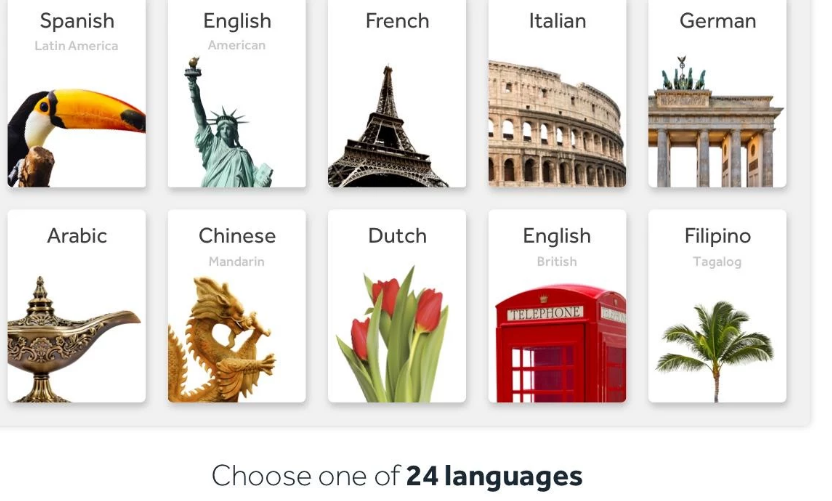
Same as Babbel, can be a good alternative but it is quite pricey.

Leave a Comment